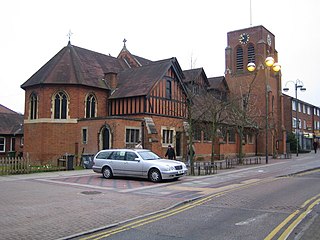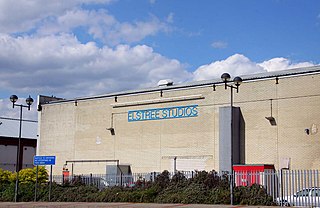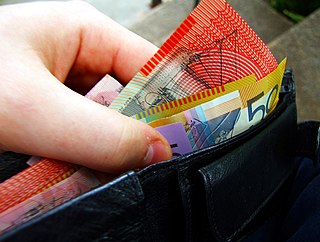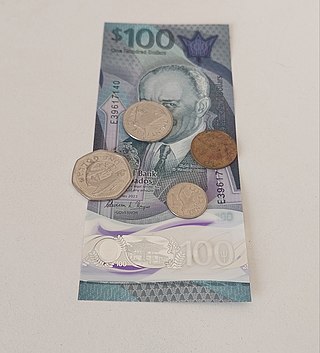
The naira is the currency of Nigeria. One naira is divided into 100 kobo.

The pound sterling is the official currency of the United Kingdom, Jersey, Guernsey, the Isle of Man, British Antarctic Territory, South Georgia and the South Sandwich Islands, and Tristan da Cunha.

The Bank of Scotland plc is a commercial and clearing bank based in Edinburgh, Scotland, and is part of the Lloyds Banking Group. The bank was established by the Parliament of Scotland in 1695 to develop Scotland's trade with other countries, and aimed to create a stable banking system in the Kingdom of Scotland.

Borehamwood is a town in southern Hertfordshire, England, 12 miles (19 km) from Charing Cross. Borehamwood has a population of 36,322, and is within the London commuter belt. The town's film and TV studios are commonly known as Elstree Studios.

Clydesdale Bank is a trading name used by Clydesdale Bank plc for its retail banking operations in Scotland.

Hertsmere is a local government district with borough status in Hertfordshire, England. Its council is based in Borehamwood. Other settlements in the borough include Bushey, Elstree, Radlett and Potters Bar. The borough contains several film studios, including Elstree Studios and the BBC Elstree Centre at Borehamwood. The borough borders Three Rivers, Watford, St Albans, and Welwyn Hatfield in Hertfordshire and the three north London boroughs of Harrow, Barnet and Enfield. Hertsmere is located mainly within the M25 Motorway.

Elstree Studios is a generic term which can refer to several current and demolished British film studios and television studios based in or around the town of Borehamwood and village of Elstree in Hertfordshire, England. Production studios have been located in the area since 1914 when film production began there.
De La Rue plc is a British company headquartered in Basingstoke, England, that produces secure digital and physical protections for goods, trade, and identities in 140 countries. It sells to governments, central banks, and businesses. Its Authentication division provides Government revenue technology, brand protection, and ID security, such as polycarbonate data pages for passports. Its Currency division designs and produces banknotes, secure polymer substrate and banknote security features. This includes security holograms, security threads and security printed products for central banks and currency issuing authorities. It is listed on the London Stock Exchange. It is the world's largest commercial printer of banknotes.

Polymer banknotes are banknotes made from a synthetic polymer such as biaxially oriented polypropylene (BOPP). Such notes incorporate many security features not available in paper banknotes, including the use of metameric inks. Polymer banknotes last significantly longer than paper notes, causing a decrease in environmental impact and a reduced cost of production and replacement. Modern polymer banknotes were first developed by the Reserve Bank of Australia (RBA), Commonwealth Scientific and Industrial Research Organisation (CSIRO) and The University of Melbourne. They were first issued as currency in Australia during 1988 ; by 1996, the Australian dollar was switched completely to polymer banknotes. Romania was the first country in Europe to issue a plastic note in 1999 and became the third country after Australia and New Zealand to fully convert to polymer by 2003.

The dollar has been the currency of Barbados since 1935. Globally its currency has the ISO 4217 code BBD, however, unofficially in Barbados the International vehicle registration code BDS is also commonly used, a currency code that is otherwise reserved for Bangladesh outside Barbados. As such the present Barbados dollar has the official ISO 4217 code of BB which matches the [dot] .bb Cc-TLD domain names classification for Barbados under ISO 3166, plus D for dollar in the foreign exchange market. The Barbadian dollar is considered as a currency which can be divided into 100 cents, though the 1 cent coin is in the process of being phased out. In terms of population, Barbados is the third smallest country in the world after Tonga and the Seychelles to have an independent currency and monetary policy.
Banknotes have been issued for use specifically in Northern Ireland since 1929, and are denominated in pounds sterling. They are legal currencies, but technically not legal tender anywhere. This is not uncommon as most bank notes are not recognised as tender. However, the banknotes are still widely accepted as currency by larger merchants and institutions elsewhere in the United Kingdom. Issuing banks have been granted legal rights to issue currency, and back the notes with deposits at the Bank of England.

The Royal Bank of Scotland is a major retail and commercial bank in Scotland. It is one of the retail banking subsidiaries of NatWest Group, together with NatWest and Ulster Bank. The Royal Bank of Scotland has around 700 branches, mainly in Scotland, though there are branches in many larger towns and cities throughout England and Wales. The bank is completely separate from the fellow Edinburgh-based bank, the Bank of Scotland, which pre-dates the Royal Bank by 32 years. The Royal Bank of Scotland was established to provide a bank with strong Hanoverian and Whig ties.

The Bank of England, which is now the central bank of the United Kingdom, British Crown Dependencies and British Overseas Territories, has issued banknotes since 1694. In 1921 the Bank of England gained a legal monopoly on the issue of banknotes in England and Wales, a process that started with the Bank Charter Act of 1844 when the ability of other banks to issue notes was restricted.
Banknotes of Scotland are the banknotes of the pound sterling that are issued by three Scottish retail banks and in circulation in Scotland. The issuing of banknotes by retail banks in Scotland is subject to the Banking Act 2009, which repealed all earlier legislation under which banknote issuance was regulated, and the Scottish and Northern Ireland Banknote Regulations 2009. Currently, three retail banks are allowed to print notes for circulation in Scotland: Bank of Scotland, Royal Bank of Scotland, and Clydesdale Bank.

The BBC Elstree Centre, sometimes referred to as the BBC Elstree Studios, is a television production facility, currently owned by the BBC. The complex is located between Eldon Avenue and Clarendon Road in Borehamwood, Hertfordshire, England.

Kriya is a British business finance lender, specialising in invoice finance, business loans and embedded finance. It is described as a FinTech company.

Northern Bank Limited, trading as Danske Bank, is a retail bank in Northern Ireland. Northern Banking Company Limited was formed from a private bank, with the Deed of Partnership being signed on 1 August 1824. It is one of the oldest banks in Ireland with its private banking history dating back to 1809, and forms part of one of the Big Four banks in Ireland. Northern Bank took on the name of its parent company Danske Bank as its trading name in November 2012. It is a leading bank in Northern Ireland and a growing bank in Great Britain. In Northern Ireland, the Bank issues its own banknotes.

The Bank of England £5 note, also known as a fiver, is a sterling banknote. It is the smallest denomination of banknote currently issued by the Bank of England. In September 2016, a new polymer note was introduced, featuring the image of Queen Elizabeth II on the obverse and a portrait of Winston Churchill on the reverse. The old paper note, first issued in 2002 and bearing the image of prison reformer Elizabeth Fry on the reverse, was phased out and ceased to be legal tender after 5 May 2017.

The ATM Industry Association (ATMIA), originally the ATM Owners Association, was established in 1997 in the United States as a global nonprofit trade association to service an industry that built around the global growth of the ATM.
The Danske Bank £20 note is a sterling banknote. It is the second smallest denomination of banknote issued by Danske Bank in Northern Ireland.
















